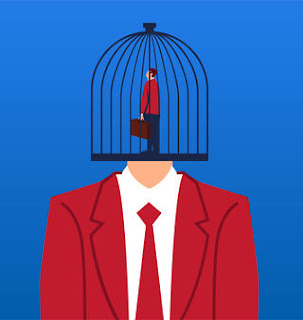There are times when certain events or incidents in our lives results in a downward spiral for us and makes it difficult for us to come out of it. Finding ourselves in a rut, we struggle hard to be positive and productive. When we brood over to find the reason for the debacle, we can easily conclude that it was merely a negative thought that triggered this domino effect (negative) and adversely impacted us, in terms of feelings and behaviour. Considering the fact that we get a large number of thoughts in a day (if experts are to be believed, we get over 50,000 thoughts in a day), it's easy to fall prey to negative thoughts and lose ourselves in gloom and doom.
 Breaking this "thinking trap(negative)" is crucial for our healthy and productive existence because of the established connection between Thoughts, Feelings and Behaviour (Actions). A negative thought has the potential to impact us emotionally, so, the sooner we become aware of these damaging thinking patterns of ours, the healthier we will be emotionally and holistically.
Breaking this "thinking trap(negative)" is crucial for our healthy and productive existence because of the established connection between Thoughts, Feelings and Behaviour (Actions). A negative thought has the potential to impact us emotionally, so, the sooner we become aware of these damaging thinking patterns of ours, the healthier we will be emotionally and holistically.
Among the many thinking errors that we commit, i have handpicked few important ones that hugely impact us during crisis, because crisis is a time when we become quite tentative in our approach toward events and situations. Recognizing these thinking errors that are listed below will lead us to become more rational in our outlook and approach to life and events.
The five such thinking errors are :
- Overgeneralization : This happens when we arrive at a conclusion based on a single occurrence of something. We start perceiving that things will go in a particular way/ direction because it has gone so once. We tend to lack any rationality during overgeneralization. The moment we start inferring from a specific evidence is when we start falling prey to overgeneralization and this happens more during crisis because of the strong influence of negativity around us. Example - Failing in an exam, interview or a venture, once or twice leads us to doubt our capability and we start to engage in thoughts laden with "always" and "never". Thoughts like "I am always making a mess of things" are indicative of overgeneralization.

- Mental Filter : For whatever reasons, when we start to observe/ notice something specific and dismiss everything else is when we fall trap to the thinking error known as mental filter. When we operate with a distorted framework of life, fraught with bias, we may only allow negative information to reach out to us. It may also result in us magnifying such information to suit us and that may prove to be very detrimental for thinking rationally. Example - Taking the same context of a venture, exam or an interview, when we focus only on what we couldn't manage to do instead of what we could is when we start to perceive things through a negative lens.

- Catastrophizing : When we find ourselves engaged in "worst-case scenario" thinking and imagine about how worse things/ situation could get. we fall prey to catastrophizing. What's wrong about this type of thinking is that we completely ignore the status quo, which may happen to be good or not-so-bad, and keep our thoughts focused on the worsening of the situation. Example - A fight with a friend or disagreement with boss may result in thoughts as "I will lose my job" or "I can never develop a trustworthy friendship".

- Polarised Thinking : When we find ourselves thinking in extremes about people, situations and events, we suffer from polarised thinking. It's like "Black & White" or "All or Nothing" thinking, with no middle ground, such as "good or bad", "right or wrong", "positive or negative", and so on. This type of thinking may push us into other thinking traps as well. Example - Thoughts like "None of us will survive this crisis" or "I have to get this right else it's no use at all" are indicative of Polarised thinking.

- Emotional Reasoning : This is all about believing that what we feel must be true. The feelings we undergo at any point of time is how we perceive the things to be. For example, in case we feel anxious, we think that anxiety is what everyone else would also be undergoing. Example - During a crisis or difficult times, we tend to get overwhelmed and thoughts like "Since I am feeling anxious, the situation must be anxiety ridden".

These thinking errors inflict more damage during time of crisis, when uncertainty and fear grips us and we struggle for hope and optimism. One of the key reason we fall to these thinking errors is our brain's disposition towards finding shortcuts to help us during decision-making and problem solving. Factors like our belief system and life experiences also contribute to us committing these thinking errors (topic for an altogether different blog post).
(Related Article : Cognitive Biases - Braving The Brain Barriers ! )
What's more important during this time when we recognise ourselves fallen to the thinking trap is to ensure taking appropriate steps to address these thinking traps. Few steps that could help
- Accepting the thinking error in us
- Validating it with sufficient evidence
- Identifying the source of the thinking error being committed by us
- Detaching our personal opinion from the ensuing thoughts triggered by an event/ situation
- Building multiple perspective to the situation/event
- Building more rationality in our thought process
Watch your thoughts before they get better of you !
N.B. :
- The images used in the above post have been sourced from the internet

No comments:
Post a Comment